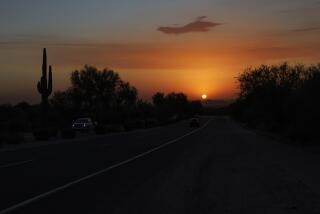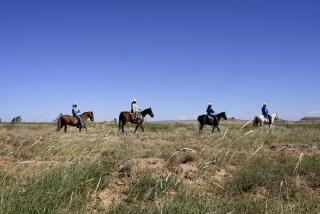Hindu Culture Is Taking Root in Arizona Enclaves
PHOENIX — When Usha Venkatesh arrived in Phoenix from India six years ago, after her marriage was arranged with a local software engineer, she had few friends and no family to turn to here.
Already homesick, her loneliness was compounded by the fact that there were no Hindu places of worship in Phoenix.
“There was a void in my heart,” she said. “I used to go to the temple every Saturday morning when I was back home. And here, I couldn’t go even on special occasions.”
These days, Venkatesh can take her pick.
The last few years have seen the culmination of years of efforts by the local Indian community to establish Hindu pockets of worship in Arizona.
There are now four Hindu temples and an International Society for Krishna Consciousness (ISKCON) center in the Phoenix area, another ISKCON center in Tucson and a Hindu temple in Yuma, along the Arizona-California line.
“The Indian community wanted to have a common gathering ground where people could meet and pray,” said Krishnan Bala, a local dentist and vice president of the Maha Ganapati temple in Maricopa, south of Phoenix.
When Bala moved to Phoenix 22 years ago, there were only about 500 Indian families in the metro area, he said.
The population has swelled considerably, said Bala, as corporations like Intel, Motorola and Honeywell have attracted software engineers and other high-tech professionals from India to the region.
The temples fulfill a need for Hindu families to congregate and pray and teach their U.S.-born children about their cultural heritage.
When the ISKCON society, commonly known as the Hare Krishna movement, opened its doors in 1996 to Phoenix residents, it received an overwhelming response from the Hindu community.
“There was no room to stand during the arathi [services],” said Bhakta Raj Das, director of the center in Chandler, a suburb southeast of Phoenix.
Located on a half-acre plot that once housed a martial arts school, the temple attracts Hindus from as far away as Flagstaff in northern Arizona.
The meditation hall at the center is packed every Sunday evening with close to 200 devotees chanting hymns and swaying to music.
The smell of Indian spices wafts through the hallway, while the sound of drums and the harmonium filters through the walls.
The hall is crammed with a diverse crowd including both Indians and Americans, some dressed in jeans, others in saris or saffron robes.
Clapping to the beat and moving to the rhythm, the crowd sings the praises of Lord Krishna before lining up to receive the weekly feast that a family has sponsored that evening.
In keeping with their philosophy, all Hare Krishna temples serve only lacto-vegetarian food, prepared by devotees in the kitchen on the premises.
“Anybody can help in the kitchen, or with decorating and cleaning the temple,” said Bhakta Raj Das, who oversees the daily operations of the center assisted by a staff of 12 full-time disciples who live there.
The temple has a library, a gift shop and a Sunday school where about 30 children gather weekly to learn about Indian culture, recite prayers from the ancient scriptures and learn Hindi.
“It’s more like a spiritual education to help the children retain their heritage,” said Bhakta Raj Das.
“We want to teach our children about our culture,” added Shiva Ramachandran, who is on the board of directors at the Maha Ganapati temple in Maricopa.
On a recent Sunday morning, his 6-year-old daughter, Akila, dressed in bright Indian clothes, boldly recited prayers before a gathering of about 50 people while her 2-year-old sister napped in her father’s lap.
A regular visitor to the temple along with his wife and children, Shiva continues his children’s spiritual education at home when the family gathers for prayers every morning and evening.
Beenu Govindrao also tries to retain her daughters’ Indian heritage as much as possible by taking them to a second Hindu temple in Chandler every week. Her younger daughter, Kavya, 11, learns the veena, a stringed Indian musical instrument, from a teacher there, while her older daughter, Sneha, 13, listens.
“They love going to the temple,” Beenu said. “I want them to be exposed to the temple culture as much as possible.”
Planning is now under way to build a traditional Hindu temple at the current Maricopa site, spread on 15 acres of land donated by Bala.
“We want to serve the community by building an open temple for everybody to come and worship,” said Bala.
Similar sentiments drove efforts to establish the Hindu Temple of Arizona in Scottsdale, which opened in a former church last June.
“We wanted to form a temple that would serve the whole Indian community,” said Hara Misra, president of the Scottsdale temple. “We are very pleased with the response from the Indian community.”
More to Read
Sign up for Essential California
The most important California stories and recommendations in your inbox every morning.
You may occasionally receive promotional content from the Los Angeles Times.










